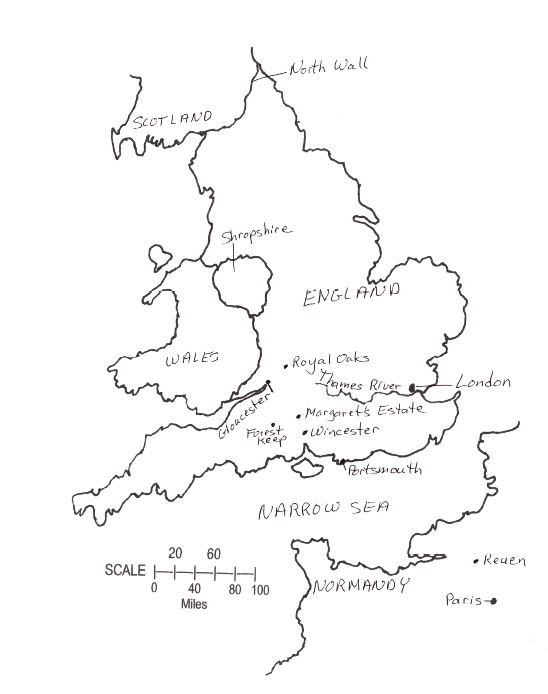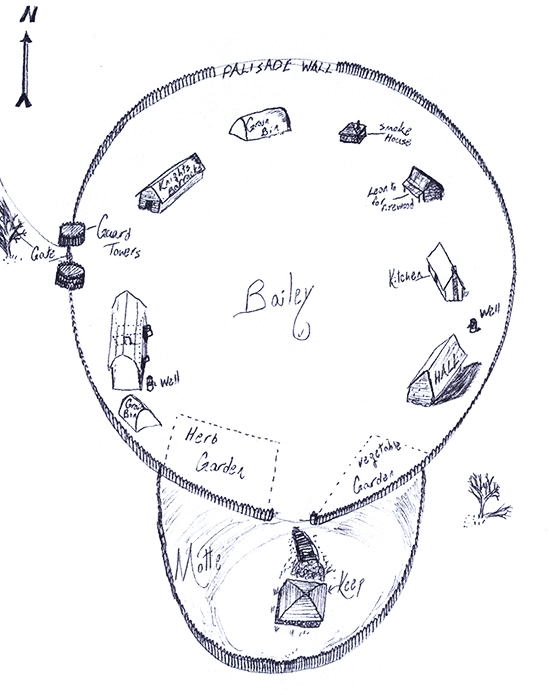Lady Margaret Extras
Characters and More
Edouard, Earl of Three Ridges. His wife is Lady Ridges. His heir is Young Edouard.
Henry de Beaumont, 1st Earl of Warwick. Holds the most lands for the Crown and is the most powerful earl. His immediate support of Henry helped make him King of England.
Lord Artus. Vassal to a baron, who is a vassal to Lord Ridges.
Lord Bardoul. A baron who is a vassal to Lord de Belleme.
Lord Chancellor. An important figure in the royal court who is head of the Norman judiciary system, handles the king’s legal matters, holds and protects the royal seal, and oversees the court scribes; one of the few noblemen who can read, write, and figure because he is also a priest.
Lord Charles of Royal Oaks. His estate lies three days’ ride north of Gloucester in Worcestershire.
- Rosamonde. His wife.
- Their Children:
- Lady Margaret (also called Margery),
- Young Charles, heir to the estate
- Raymond
- Lady Cecily
- Their Children:
Robert de Belleme: 3rd Earl of Shropshire and Shrewsbury. Holder of those and several other estates; the most powerful lord in England after the Earl of Warwick.
Sir Bruis. Knight-errant in service to Lord Charles of Royal Oaks.
Sir Ignace. Knight-errant in service to Lord Charles of Royal Oaks.
William I (the Conqueror), formerly Duke of Normandy. Married Matilda of Flanders. Invaded England in 1066 A.D., had himself crowned King and ruled England until he died in 1087.
- His sons in order of birth:
- Richard. Deceased. Hunting accident.
- Robert. Passed over by his father and given the Dukedom of Normandy instead. He joined the Grand Crusade to the Holy Land in 1097 in search of wealth.
- William II (also called William Rufus). The favored son; his father chose him to succeed.
- Henry. Fourth son and a lord. Currently holds land in Normandy, which he inherited from his mother.
Anselm, Archbishop of Canterbury. An important monk and theologian. In England he defended the Catholic Church’s interests. He has been exiled by King William II since 1097.
Father Ambroise. Priest on Sir Charles’s Royal Oak’s estate.
Gerard, Bishop of Hereford. Appointed by King William I as his Lord Chancellor, he also served King William II. When Anselm, Archbishop of Canterbury, was refused re-entry to England after a visit to the pope, Gerard assumed some of Anselm’s duties for the remaining bishops.
William Giffard, Bishop of Winchester. Nominated to his position 3 August 1100 by Henry; probably due to Henry’s efforts to win Church support for his claim to the English throne and to reward Giffard for his support
Aldrich. Farmer, village elder and a former reeve of Lord Charles’ estate.
Cook. Head person in a kitchen who supervised a staff of bakers, undercooks, scullery maids, men, and other persons needed to feed everyone inside the bailey.
Fearn. Fourteen, Lord Charles’ latest bedmate.
Goda. Aldrich’s wife.
Holen. A Saxon woman.
Jorgon. Ten, a stable boy for Lord Charles.
Jorgon Elder. Jorgon’s father and a villein on Lord Charles’ estate.
Reeve. The title of the Saxon leader elected by the Saxon men for a one-year term. He assigns common land for planting and decides all other matters among the Saxons. He reports to his lord’s seneschal or to the lord himself.
Aegdyth. Princess of Scotland and sister to King Domnall; later renamed Matilda.
Caitlin. Irish. Brought to London to be sold as a slave, bought by Lord Charles as a wedding gift for his bride. She has been the nursemaid to Lady Margaret since her birth.
Domnall, King of Scotland. Also known as Donald Bane and King Donald III.
Advent. Period of fasting and reflection, which starts the fourth Sunday before Christmas Day.
Anno Domini. (A.D.): Latin for “in the year of Our Lord.” We now use C. E. (Common Era).
anon. Immediately.
bailey. A large area, usually protected by a dry or wet moat, surrounded by a tall wooden or stone wall called a palisade, encircles the Hall, Keep, kitchen, garrison, chapel, and other buildings where a lord, his family and his retainers reside.
bedmate. Polite term for any woman a man takes to his bed and uses for his pleasure, whether for a night or longer. Usually, a Saxon who had no choice in the matter.
bliaut (a). A Norman-French word. A Norman woman’s outer garment to the wrists and ankles, fitted to the elbows for fashion, then flared to the wrist and to hips, then flared below for easy walking, usually wool in winter and linen in summer.
board. The right to be fed and have a table or bench to sleep upon as part of one’s service.
boon. A gift or favor granted by one person to another.
C. E. Common Era is the modern term used to describe years. It replaced “A.D.” (Anno Domini): Latin for “in the year of Our Lord.”
chatelaine. Usually the landholder’s wife; she is responsible for everything on the estate except its safety and men’s hunting practices.
Christmastide. The days from Midnight Mass on December 24 through the Epiphany on January 6.
Church. The one, catholic, true religion taught by Jesus the Christ and practiced throughout Western Europe; the pope in Rome was its head; also called the Christian Church.
Confession. A requirement to state one’s sins to a priest, receive absolution and to do penance before being permitted to receive Holy Communion.
courses. The monthly cycle of a woman losing blood because she is not with child. While a girl may be contracted to a marriage, the wedding may not be blessed, and she may not be bedded until her courses come.
dais. In a hall, a platform two to four steps high upon which sits a table and benches, stools or chairs and from which the lord of the estate and his family dine and rule.
ditch woman. A girl/woman whose father/husband has thrown her out of her family for unacceptable behavior, such as disobedience, having sexual relations outside marriage, running away, etc. She lives in fear of her life because anyone can do anything to her; she is a pariah.
Epiphany (January 6). The twelfth day after Christmas, believed to be the day the Magi visited the Christ child and gave him gifts; a time of gift giving and feasting.
excommunicate. A severe penalty for a gross offense to the Church that results in a person’s inability to receive the sacraments or be buried in holy ground. One must still attend Mass. The penalty is reversible if one repents, goes to Confession, completes a penance and changes one’s ways. One is then readmitted to the Body of Christ’s followers and to His Church.
feudalism. All of England was owned by the king. He portioned out some of it to be held by those beneath him, who worked and protected it on his behalf. An earl held vast tracts of land and answered directly to the king. With royal permission, an earl could separate his lands into baronies and raise a lord or knight to that station. In turn, either the earl or baron could then assign land within a barony to a knight who could then marry because he was a landholder. Each rank owed military service and taxes to the station directly above his.
fostered, fostering. An exchange of children so they may be trained to specific skills and become aware of other families on other estates. Sometimes used as a prelude to marriage.
garrison. A building where unmarried knights live.
girl. Any unmarried female, no matter her age.
Grand Crusade. In 1095 Pope Urban II called all of Christendom to a crusade to free Eastern Christians from Turkish rule and to take possession of the Holy City of Jerusalem. When Jerusalem fell to the Turks in 1147, a second Crusade was called and the custom of numbering the Crusades began; this one was then renamed the First Crusade.
gunna. A Saxon word for a long-sleeved woolen dress worn to the ankles and fastened to the body with a belt. Most Saxon women owned only one, which they wore until they were annually given cloth by their lord to make another one in preparation for Easter. Similar to a bliaut, but straight from shoulder to hem.
Hall. The building where the Norman members of an estate dine and conduct business.
Holy Communion. A piece of bread and a sip of wine transformed into the body and blood of Jesus the Christ by a priest during Mass. The ceremony unites all of Christendom, and only those in good standing with the Church may partake in it.
Keep. A square building usually of stone, sometimes of wood, where the Norman lord and his family may flee for safety if his estate is attacked and his bailey is breached; generally they live there.
knight errant. Designates a fighter in arms who serves or is hired by one of rank without his being given land, called “Sir” out of politeness but bears no rank.
knight landed or just knight. A knight errant who has been given land and who may now marry; he serves a man of a noble rank above his; his is the lowest noble title during these times (See “titles”).
Lent. Forty days of fasting and prayer from Monday through Saturday, begun on Ash Wednesday and culminating on Easter Sunday.
litter. A curtained and canopied conveyance for a lady of rank. She sits or lies among cushions, blankets and furs on a wooden plank while the device is attached to a horse front and back. No real lady rides unless she must.
mantle. A hoodless, sleeveless warm outer covering worn by men and women (what we call a cape).
mark. A measure of money equivalent to 160 pennies. In 1096, 10,000 Marks was 1.6 million pennies when two pennies bought a boar pig, one penny bought a sow, and piglets were two for a penny.
marriage chest. A wooden chest, carved or plain, into which a girl places the linens she has hemmed and all manner of clothing, fabrics, household goods and items she has made or acquired and will take with her to her new home. During the 20th century, it was called a “hope chest”.
Mass. A religious service lead by a priest or higher member of the Church in which all Christians attend and those in good standing with the Church receive Holy Communion as a way of uniting all Christendom and keeping its members faithful.
May Day. May 1.
Michaelmas. September 29.
Midsummer. The summer solstice, usually June 21 or 22, depending on the moon cycles in that year.
Millennium (The). Believed to be 1000 AD, though some argued it was actually 1001AD; the time the Church believed Jesus the Christ would return.
mortal sin. A misdeed that will cause your soul be sent to Hell if it is not forgiven and more serious than a venial sin, which is a misdeed and a minor offense against God and/or the Church.
New Forest. An area southwest of Winchester, England, formed by King William II because he wanted easy access to a forest to hunt deer and boar. He displaced several prominent lords from prime property and gave them lands elsewhere, destroyed their buildings and had trees planted.
Norman. Both the name of the group and the language the Normans of England and Normandy spoke during the twelfth century. We now call the language Old Norman-French.
palisade. The wall of wooden timbers or of stone which surrounds the bailey and all within; usually has either a dry or wet moat around it for further protection and only one gate for entrance.
parchment. Sheep skin that has been pounded thin and stretched and upon which records are written.
pariah. A person who has done something so awful that all of society shuns her/him; an individual who has no social protections.
penance. Prayers and good deeds that must be completed before one’s sins are expunged and before one can receive Holy Communion during Mass.
Percheron. A horse, usually black but sometimes gray, from Perche, a region which is now in northwest France.
pottage. Soaked grains, into which can be thrown leftover vegetables and meats, that is cooked and turned into a soup/stew served in the morning. This word was later changed to porridge.
pulses. Most commonly peas or other pod vegetables that grow quickly and can be eaten fresh or dried. Remember the song/verse: “Peas porridge hot. Peas porridge cold. Peas porridge in the pot nine days old.”
rank. See titles. Within each title, men are ranked according to how much land they hold, their level of wealth, and how the royals favor them. Wives, sons, and daughters hold the same rank as the head of their household.
reeve. On an estate, a man who has been elected each January by his fellow Saxons to oversee all the assigning of land, planting, growing, and harvesting of crops. Traditionally, he may elected only three times before another man must be chosen.
rib. See wedding rib.
Saxon. Both the people of England who were invaded in 1066 by King William I (the Conqueror) and the language they spoke. We now call their language Old Saxon.
seneschal. The man in charge of the estate who follows his lord’s orders and the chatelaine’s instructions, like the foreman of a ranch.
serfs (see villeins). Term for the persons tied to the land owned by the king, earls, barons, and lords, as part of the feudalism system common on the European continent. Usually they are not free, but they are not bought or sold as if they were slaves.
shift (a). A soft undergarment of linen or wool slightly smaller than a bliaut or gunna to protect one’s skin from chaffing.
simples. Ointments, creams, powders, and other simple remedies for a variety of illnesses and ailments; most use pig fat as a base.
sodomite. A man who loves/has sexual relations with another man.
stone (a). A unit of weight equal to 14 pounds.
titles
- Royal. King/Queen, Prince/Princess
- Noble* – Baron/Baroness (called Lady), Earl/Countess (called Lady), Lord (sometimes addressed as Sir/Sirrah)/Lady, Sir (Sirrah)/Lady (a knight who owns land)
- * During these years titles of address were fluid. All the nobles except for knights landed could be—and often were—addressed as “Lord”—even the earls—and many times the barons/earls and lords were informally addressed as “Sir.”
three days’ time. The time between judgement and execution; required by the Church so clergy had time to save the person’s soul and to prepare her/him for death.
trial by combat. Under Norman law, only an accused Norman could fight to prove his innocence. The one accused chose the weapons and rules. If the accused won the contest, a formal trial was never held because God had protected the righteous one and made him victorious.
vassal. Under the feudal system, any person who holds land and owes taxes, homage, fealty and/or military service to an individual of higher rank; in England all are vassals except the king.
villeins (see serfs). Term used in England for those tied to the land, who are not free.
walkway. Structure attached behind the palisade upon which guards may stand and defend the bailey.
warrior priest. A priest who has been trained as a swordsman and fighter and who guards the Church’s property. After King William II prevented Archbishop Anselm from appointing bishops and took their lands for the income, several bishops created these men to protect themselves and their bishoprics.
wedding rib. A strip of woven, lightweight cloth 3-6 inches wide that is used as decorative trim on clothing or is wrapped around a woman’s long hair when she wears it in two braids. Thin ribs are often woven into braids for decoration. We now call them ribbons.
wattle and daub. A form of construction using softened sticks woven tougher (wattle) and a mud of dirt, straw and other ditreous (daub) to form walls of a hut that is then roofed with thatch. A common home for Saxons during this era.
wench. A female servant, whether girl or woman.
Join the Group
Would you like to receive free short stories and other free goodies? Simply join Victoria’s monthly newsletter.


